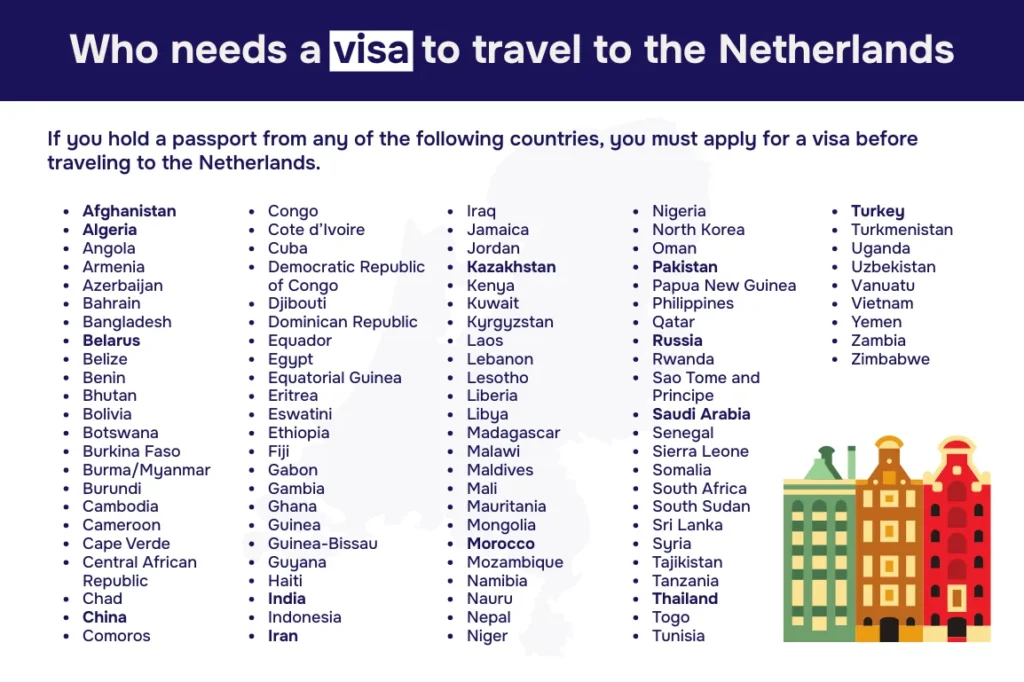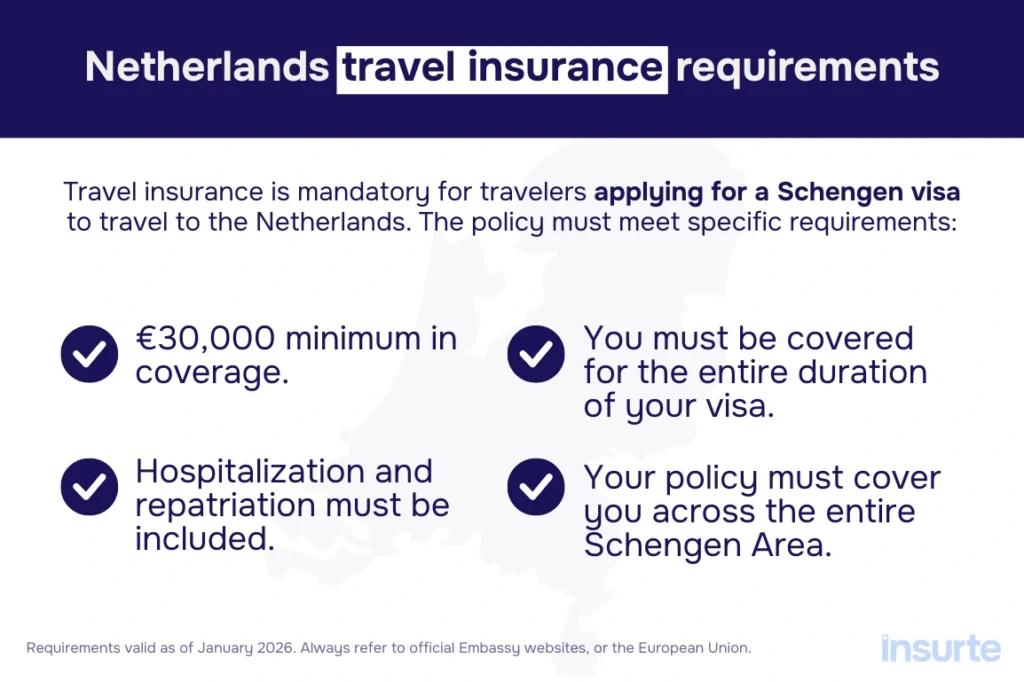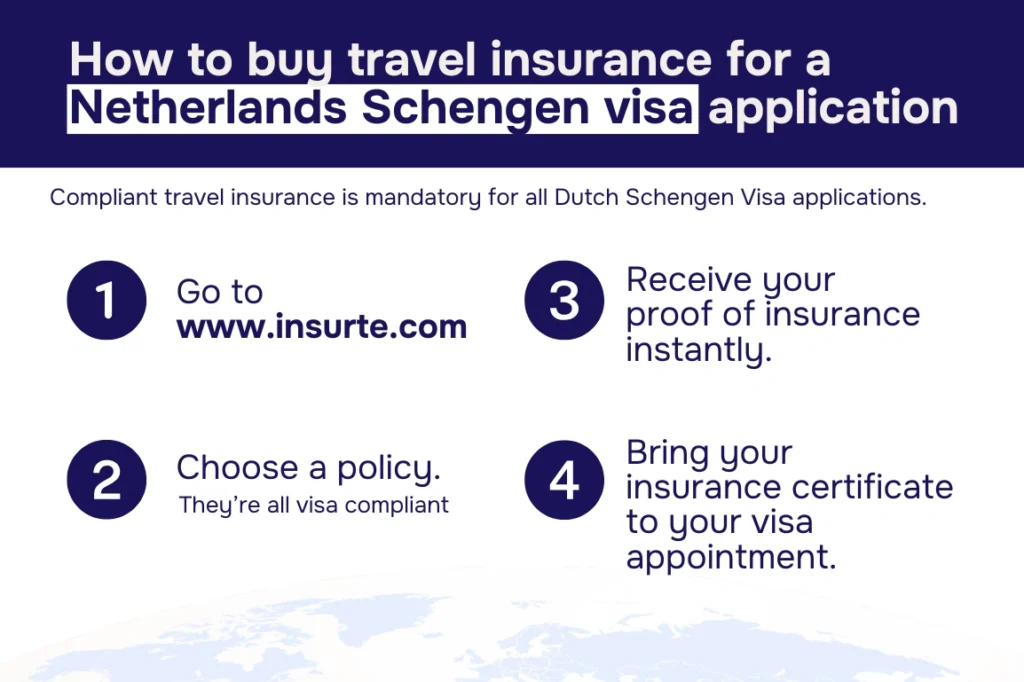Home > How to Apply for a Visa for the Netherlands (2026)

How to Apply for a Visa for the Netherlands (2026)
Hundreds of thousands of travelers apply for visas to go to the Netherlands every year. In 2024, more than 728,000 people applied (the European Union releases new data every Spring, so we should have the numbers for 2025 soon).
Many travelers need to get a visa to visit the Netherlands, whether the trip is a short one (a couple of days) or a longer one.
Getting a visa for the Netherlands isn't as simple as filling out a form online. It's a pretty involved process that contains multiple steps. If it's your first time, the Schengen visa application process can feel intimidating. This guide will give you all of the information you need to know, so you understand what the process will be like, as well as what will be required of you.
It all starts with understanding whether or not you need a visa for your trip to the Netherlands.

Who requires a visa to enter the Netherlands
Whether or not you need a Dutch visa mainly depends on your nationality and how long you're planning to stay. For many travelers, especially those from EU/Schengen countries, a visa isn't required.
If you’re a citizen of a visa-exempt country (like the US or UK), you do not need a visa for short stays in the Netherlands. Short stays are trips that are fewer than 90 days in length. If you want to stay longer than 90 days in the Netherlands, or want to work while you're there, you'll need to apply for a long-stay visa.
If you’re not a citizen of a visa-exempt country, you need a visa to enter the Netherlands. (This includes China, South Africa, India, and others). Whether your trip is 1 day or 100, you'll need to apply for a visa. Trips less than 90 days require a Schengen visa.
How to apply for a Schengen visa for the Netherlands
If you need a Schengen visa for your trip to the Netherlands, you'll need to go through the Schengen visa application process.
Millions of travelers apply for Schengen visas each and every year, so while the process includes a few steps, it is pretty streamlined.
The process typically goes as follows:
- Check to be sure you need a visa. You can check on the NetherlandsWorldwide, an official government site.
- Gather all of the required documents.
- Book an appointment at a Dutch visa application center or consulate.
- Attend your in-person appointment.
- Submit your application.
- Receive an answer!
In some countries, you may be able to apply for a Dutch visa online through the official immigration website. With that being said, you’ll need to schedule a Dutch visa appointment at your nearest visa center or consulate to finalize your application and submit your biometrics (fingerprints).
If you're applying from the US, you need to book your appointment with VFS Global.
Note: As of August 4th, 2025, visa application centers only accept digital visa application forms for the Netherlands.
Instead of filling out the application form by hand, you will have to do so digitally. You'll need to create an account here.

Rejection rates
In 2024, the global rejection rate for Schengen visas for the Netherlands was 15.5%. In 2023, it was 17.07%.
Rejection rates are not a reliable indicator of whether or not your visa will be approved or denied. One, they are global averages, so they don't reflect specific, real-life scenarios.
Second, they are constantly changing and differ depending on several different factors, like the nationality of the applicant, the visa they’re applying for, seasonality, and more.
When to apply for your visa
The Dutch Government recommends applying for your Schengen visa no later than 45 days before your trip. That said, you can apply up to 6 months in advance.
Visa processing times vary, but it typically takes around 15 business days.
While processing times are usually relatively quick, appointment slots can fill up fast. This is one of the reasons starting the process early is recommended.

Dutch visa application requirements
To obtain a Schengen visa for the Netherlands, you need to meet Schengen visa requirements. Applicants who don't meet one or more of the criteria are likely to have their visa applications denied.
According to the Dutch government, applicants must provide the following documentation with their Schengen visa application.
- Valid passport
- Passport-sized photos
- Completed visa application form
- Flight itinerary
- Proof of accommodation
- Schengen travel insurance
- Proof of financial means
To learn more about each of these specific requirements, we encourage you to read the Schengen visa requirements guide.

Visa insurance requirements for Dutch Schengen visas
All Schengen visa applicants have to take out a travel insurance policy that meets Schengen visa requirements. Without compliant insurance, your Schengen visa application will be rejected.
The infographic above shows the requirements your policy must meet, which include:
- €30,000 minimum in emergency medical coverage.
- Hospitalization and repatriation guarantees must be included in the policy.
- The applicant must be covered for the entire duration of the trip, and across the entire Schengen area, regardless of travel plans.

What a Dutch Schengen visa allows you to do
Schengen visas, in general, allow their holders to travel to any of the 29 Schengen countries, so long as their visa is still valid. That means that with a Schengen visa for the Netherlands, you should be able to travel to other Schengen countries, too.
Still, make sure you check the exact allowances on your physical visa. Your visa will tell you specifics about what it permits, like one entry, multiple entries, or specific limitations.
It's uncommon, but there can be some cases where a Schengen visa doesn't allow you to travel throughout the zone, so it's always best to check.
A Dutch Schengen visa does not allow you to travel to the UK or Ireland. If you're hoping to visit either of these countries, you may need to apply for additional visas, and the process is different as neither is part of the Schengen area.
Do I need to apply for ETIAS if I have a Dutch visa?
No, if you hold a valid Netherlands visa, you will not need to apply for ETIAS. Additionally, if you are a citizen of a Schengen country, you also do not need ETIAS to visit the Netherlands.
Learn more about ETIAS and the Netherlands in our ETIAS Netherlands Guide

FAQs: Dutch Schengen visas
You might also like these visa guides...
Going to Spain? Do I need a visa to go to Spain
Planning a trip to France? Getting a visa for France
Germany on the horizon? You may need a German visa
Off to Portugal? Check out the Portugal visa guide
Are you going to Greece? Check if you need a Greek visa
Trip to Luxembourg coming up? Read about Luxembourg visas
Planning a trip to Malta? Getting a visa for Malta
Off to Iceland? Check out the Iceland visa guide
Planning a trip to Italy? Learn about Italian visas
Going to Denmark? Read our Denmark visa guide
Going to Hungary? Read about Hungarian visas
Trip to Austria coming up? Read our Austria visa guide
Planning to go to Switzerland? Read about Swiss visas
Are you going to Norway? Read the Norway visa guide
Trip to Poland? Learn all about Polish visas
Planning a trip to Croatia? Learn about Croatia visa requirements
Going to Bulgaria? You might need a Bulgarian visa
Are you going to the Czech Republic? Read about Czech visas here
Trip to Finland on the horizon? You may need a Finnish visa
Traveling to Liechtenstein? See Liechtenstein visa information
Are you traveling to Sweden? Learn about Swedish visas
Heading to Estonia? Learn about Estonian visas
Heading to Romania? Getting a visa for Romania
Going to Lithuania? Learn about Lithuanian visas
Planning a trip to Slovakia? You may need a Slovakian visa
Trip to Latvia? You may need a Latvian visa
